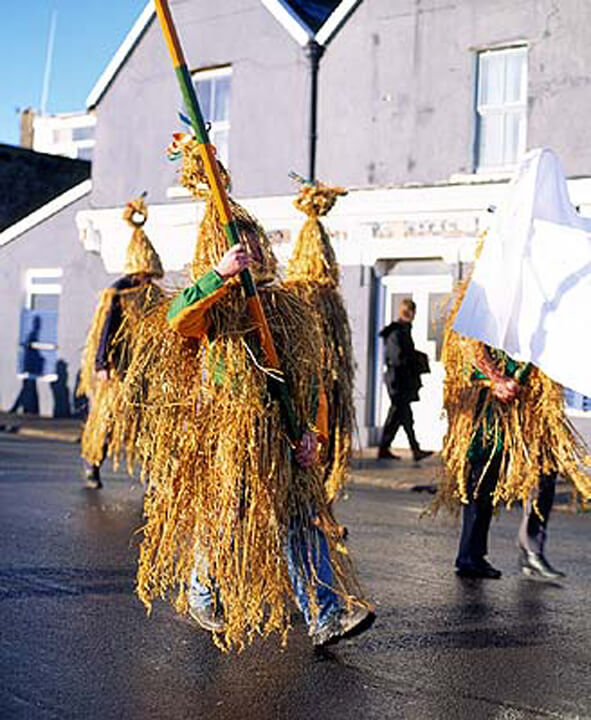While much of the English-speaking world celebrates Boxing Day on December 26th, Ireland steadfastly maintains its celebration of St. Stephen’s Day (Lá Fhéile Stiofáin). This distinctly Irish observance, with traditions dating back centuries, reflects the country’s unique cultural heritage and its preservation of ancient customs, even as modern shopping habits begin to influence the holiday.
Why Not Boxing Day?
The Irish preference for “St. Stephen’s Day” over “Boxing Day” is rooted in both historical and cultural factors. While both celebrations fall on December 26th, Ireland’s strong Catholic heritage meant that the feast day of St. Stephen, Christianity’s first martyr, held more significance than the British tradition of Boxing Day. The term “Boxing Day” originated from the British custom of giving boxes of gifts to employees and the poor, a practice that, while charitable, didn’t resonate as deeply with Irish cultural traditions.
The Wren Boys Tradition
The most distinctive Irish tradition associated with St. Stephen’s Day is the Wren Boys Procession (Lá an Dreoilín). According to ancient custom, groups of young people known as wren boys would hunt a wren, carry it through town on a decorated pole, and go door-to-door singing, collecting money for a dance or party.
The traditional wren boy song begins:
“The wren, the wren, the king of all birds, On St. Stephen’s Day was caught in the furze…”
Origins of the Wren Boys
Several theories explain this curious tradition:
- Some link it to Celtic mythology, where the wren was considered a sacred bird
- Others connect it to a legend where a wren’s song betrayed Irish soldiers to Viking raiders
- Another tale claims a wren revealed St. Stephen’s hiding place to his persecutors
Modern Wren Boy Celebrations
Today, the custom has evolved considerably:
- Live wrens are no longer hunted
- Participants dress in straw suits or colorful clothing
- Many groups raise money for charity
- Traditional music and dancing remain central to celebrations
- Communities organize formal parades and festivals
The town of Dingle, Co. Kerry, hosts one of Ireland’s largest modern Wren Day celebrations, featuring parades, music, and community gatherings.
Sporting Traditions
St. Stephen’s Day has become a significant day for sports in Ireland:
- Major GAA matches are often scheduled
- Horse racing meetings, particularly at Leopardstown, draw large crowds
- Local football matches and sporting events bring communities together
Family and Social Customs
The day holds special significance for Irish families:
- Traditional visiting of friends and relatives
- Extended family gatherings and meals
- “Leftovers Day” – enjoying Christmas dinner remnants
- Evening socializing in local pubs
- Multi-generational card games and storytelling
Modern Shopping Influence
While Ireland has traditionally kept December 26th as a day of rest and celebration, recent decades have seen the emergence of St. Stephen’s Day sales:
- Major retailers now open for post-Christmas shopping
- Online sales begin at midnight
- Shopping centers attract large crowds
- Some tension exists between traditional celebrations and commercial activities
However, unlike in the UK where Boxing Day shopping has become a major event, many Irish businesses still remain closed, preserving the day’s traditional character.
Regional Variations
Different parts of Ireland maintain unique local traditions:
- In Cork, the Wren Boy tradition remains particularly strong
- Dublin emphasizes sporting events and family gatherings
- Rural areas often maintain more traditional celebrations
- Coastal communities might include seaside walks or swims
Food and Drink Traditions
Traditional St. Stephen’s Day fare includes:
- Christmas dinner leftovers transformed into sandwiches
- Spiced beef (particularly in Cork)
- Hot whiskeys and mulled wine
- Traditional baking and desserts
Preserving Heritage in Modern Times
While contemporary influences have affected how the Irish celebrate St. Stephen’s Day, many communities work to preserve traditional elements:
- Local heritage groups organize traditional Wren Boy processions
- Schools teach children about the customs and their significance
- Museums and cultural centers host special exhibits
- Community centers organize events combining old and new traditions
The Future of St. Stephen’s Day
As Ireland continues to modernize, St. Stephen’s Day celebrations adapt while maintaining their distinct character:
- Growing interest in cultural heritage among younger generations
- Blend of traditional customs with contemporary celebrations
- Increased focus on community and charitable aspects
- Revival of traditional music and dance elements
Conclusion
St. Stephen’s Day in Ireland represents a perfect example of how ancient traditions can adapt to modern times while maintaining their cultural significance. Unlike Boxing Day’s more commercial focus, the Irish celebration continues to emphasize community, family, and cultural heritage. Whether participating in a Wren Boy parade, attending a sporting event, or simply enjoying time with family, the day remains distinctly Irish in character.
The persistence of St. Stephen’s Day traditions, even as shopping culture grows, demonstrates Ireland’s ability to balance preservation of cultural heritage with modern influences. It’s this blend of old and new that keeps Irish traditions alive and meaningful for each new generation.


